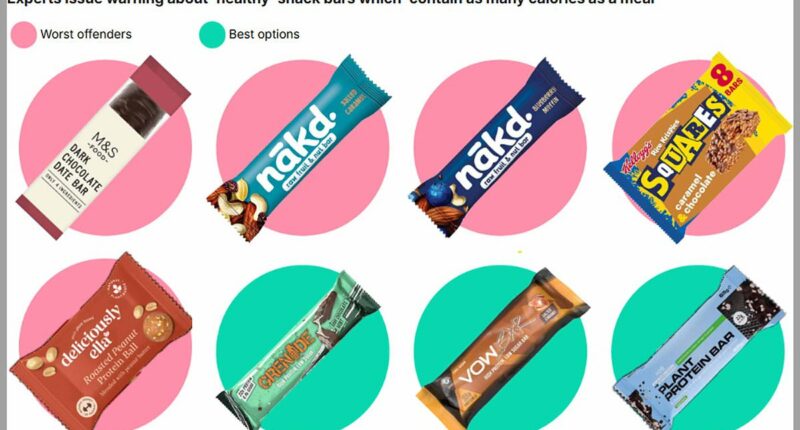Share this @internewscast.com
Many oat, nut, and fruit bars, often marketed as healthy snacks, may actually pack in more sugar than a Krispy Kreme doughnut, a concerning new audit has found.
Action on Salt and Sugar, a campaign group, conducted an investigation into the nutritional profiles of over 450 snack bars available across ten UK supermarkets.
The findings reveal that some of the supposedly healthiest options contain upwards of 26 grams of sugar per serving. This equates to nearly seven teaspoons of sugar or more than what you would find in two doughnuts from one of Britain’s most popular doughnut chains.
For context, NHS guidelines recommend a daily sugar intake of no more than 30 grams of free sugars, amounting to 210 grams per week.
Consuming excessive sugar over time can contribute to weight gain and increase the risk of tooth decay.
The research also uncovered that more than half of the “healthy” snack bars on sale in Britain are high in saturated fat, according to Action on Salt and Sugar.
Among those carrying ‘high in fibre’ and ‘source of fibre’ claims, nearly a third were high in sugars.
Experts today labelled the probe’s findings ‘unacceptable’, arguing that misleading marketing and ‘weak’ Government policy was fuelling a sugar crisis.
Despite seeming to be healthier, the snacks should be treated with caution, they added because they can be high in fat, sugar or salt, while also being packed with fruit and nuts.
Dr Kawther Hashem, a senior lecturer in public health nutrition and head of research and impact at Action on Salt & Sugar based at Queen Mary University of London said: ‘Parents and young people are being misled into believing these products are healthy when many contain excess sugar and calories.
‘The Government must take more assertive action by mandating clear front-of-pack labelling and tightening the sugar thresholds, introducing levies on unhealthy foods, and setting ambitious healthy sales targets to truly protect children’s health.’
Nourhan Barakat, a nutritionist at Action on Salt & Sugar, added: ‘We, as consumers, deserve honesty from food businesses and shouldn’t have to decode confusing or misleading claims.
‘Phrases like ‘natural ingredients’, ‘high in fibre’ and ‘high protein’, can be deceptive as many of these bars can be high in sugar and saturated fat.
‘It’s unacceptable that an average serving provides nearly one-third of a child’s recommended daily sugar intake, putting young children at risk of diet-related health conditions that they could carry with them for life.’
Action on Salt and Sugar’s investigation into the 458 bars found that more than a third (37 per cent) are classed as high in sugars under the UK’s ‘already generous’ and ‘outdated’ traffic-light labelling system.
When judged against the tougher Chilean warning label criteria, which classes products as high in sugar when they contain over 10g of added sugar, 68 per cent would carry the warning.

Marks and Spencers’ Dark Chocolate Date Bar was among the worst offenders, with 26.5g of sugar per serving. For comparison, a Krispy Kreme Original Glazed Doughnut has 12g
Marks and Spencers’ Dark Chocolate Date Bar was among the worst offenders, with 26.5g of sugar per serving.
For comparison, a Krispy Kreme Original Glazed Doughnut has 12g.
Nakd’s Raw Fruit & Nut Salted Caramel bar and its Raw Fruit & Nut Blueberry Muffin bar, meanwhile, both contained 17g.
Kellogg’s Rice Krispies Squares Caramel & Chocolate Snack Bars, contained 14g per serving.
Among the snack bars claiming to be high in protein, Deliciously Ella’s Roasted Peanut Protein Ball contained 16g of sugar per serving.
Nakd’s Peanut Butter Protein Bar also comprised of 13g of sugar.
Grenade’s Dark Chocolate Mint Flavour bar, however, contained just 0.4g per serving.
Given adults should have no more than 30g of free sugars per day, this means only sugar added to products — rather than those found naturally in milk, fruit and vegetables.
Some of the sugar content of the bars will be from natural sources.
As well as the 30g of free sugars per day limit, the government recommends snacks and drinks should make up for no more than 20 per cent of our daily calories.
Yet, nearly a third (32 per cent) of the products surveyed exceeded this limit, pushing excess calories well beyond what’s recommended.
The highest-calorie product was Chia Charge Chia Seed Flapjack With Sea Salt Flakes at 378 kcal per serving, followed by Chia Charge Chia Seed Flapjack With Banana at 357 kcal.
In response to the findings, Action on Salt and Sugar has urged the Government to act by making front-of-pack labelling mandatory, meaning products all require clear, consistent colour-coded or warning labels, so consumers can spot unhealthy options easily.
It has also warned that health and nutrition claims should be restricted to products ‘genuinely low in salt, sugar and saturated fat’ and targeted levies on foods high in salt and sugar should be taxed, shifting shoppers towards healthier choices.
Across the UK, average calorie intake continues to exceed recommended levels, contributing to high rates of overweight and obesity.
It also increases the risk of type 2 diabetes, cardiovascular disease, certain cancers and preventable dental decay — the leading cause of hospital admissions among children in the UK.
Sugar intake remains above recommended limits across all age groups, with children aged 4–18 years consuming almost twice the maximum limit for free sugars.













